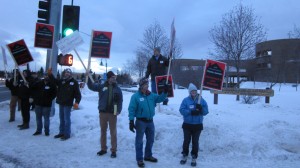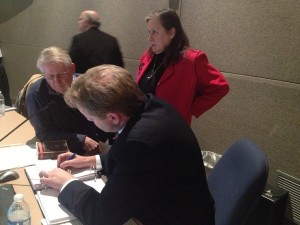The Supreme Court is now weighing whether to allow a voter referendum that would repeal Anchorage’s controversial labor law.
Attorneys on both sides of the issue made their cases before the justices on Wednesday.

About two dozen people sat in the audience while attorneys for the Municipality of Anchorage and Labor supporters argued before five Supreme Court Justices.
Attorney Michael Gatti argued for the city that the referendum should not go ahead. He said the labor law is inherently administrative in character not legislative, something the municipality has argued from the beginning, and therefore should not go before voters.
“We believe that this is not a matter that is subject to direct democracy an not subject to the referenda,” Gatti said.
The referendum allows voters to decide whether the labor ordinance, also known as AO-37, should be reversed. The Assembly passed the law last March despite protests. The ordinance takes away municipal workers right to strike and restricts collective bargaining rights. It would affect more than 2,000 city employees.
Related: Anchorage Labor Law Headed For Alaska Supreme Court
Attorney Susan Orlansky who represented labor supporters argued the referendum should proceed.
“What’s really going on here is that this ordinance in it’s entirely makes new law that fundamentally shifts the balance of power between labor and management in Anchorage,” Orlansky said. “And that’s what we’re asking the public to vote on.”
The overarching question, Orlansky says, is: does Anchorage want management to have more power and labor less?
Andy Holleman who is President of the Anchorage Education Association and one of the people who brought the case to court says it’s a simple decision that voters are equipped to make.

“What we’re doing is reversing the Assembly’s action on a given night,” Hollemans aid. “This puts it back like it was and the city can come forward again with different aspects that they think matter.”
“And hopefully they can do it in the right way with real input from everybody in advance this time.”
Anchorage Municipal Attorney Dennis Wheeler disagrees and says if the Supreme Court allows the Referendum to go ahead and it passes it could undermine the power of the city’s legislative body and spur more litigation and referenda around labor issues.
“You know we already have a lot of give an take in our labor negotiations. We have arbitrations over what the contracts mean. We have grievances over what the contracts mean. We have nine different unions to deal with. We have budgetary issues every year,” Wheeler said. “So yeah, I was always worried that this would open a flood gate.”
A flood gate that would be hard to close, he says.
The Deputy Clerk for the Municipality requested the judges have a decision by late February so that she would have time to prepare ballots for elections slated for April.
AO37 Stories:
- Assembly Repeals Labor Law, Mayor Uses Veto
- Initiative Repealing Labor Law Could be Heading for Ballot Box
- Assembly Postpones Public Testimony Decision
- Public Speaks Out on Public Testimony Ordinance
- Opponents Of AO37 Fix Petition’s Technical Flaws
- Muni Denies Referendum Petition To Appeal AO37
- Hall Proposes New Testimony Protocol, Unions Apply to Hold Referendum
- Anchorage Assembly Narrowly Passes Labor Ordinance
- Mayor Sullivan Rejects Union Offer
- Anchorage Assembly Shuts Down Union Testimony, Extends AO37 Vote
- Union Workers Testify Against Ordinance
Daysha Eaton is a contributor with the Alaska Public Radio Network.
Daysha Eaton holds a B.A. from Evergreen State College, and a M.A. from the University of Southern California. Daysha got her start in radio at Seattle public radio stations, KPLU and KUOW. Before coming to KBBI, she was the News Director at KYUK in Bethel. She has also worked as the Southcentral Reporter for KSKA in Anchorage.
Daysha's work has appeared on NPR's "Morning Edition" and "All Things Considered", PRI's "The World" and "National Native News". She's happy to take assignments, and to get news tips, which are best sent via email.
Daysha became a journalist because she believes in the power of storytelling. Stories connect us and they help us make sense of our world. They shed light on injustice and they comfort us in troubled times. She got into public broadcasting because it seems to fulfill the intention of the 4th Estate and to most effectively apply the freedom of the press granted to us through the Constitution. She feels that public radio has a special way of moving people emotionally through sound, taking them to remote places, introducing them to people they would not otherwise meet and compelling them to think about issues they might ordinarily overlook.




